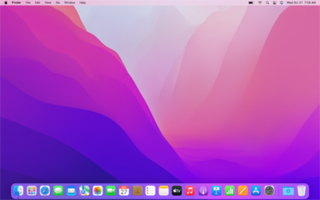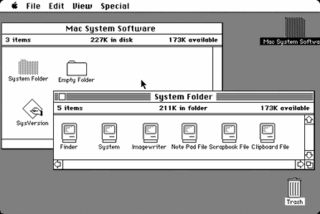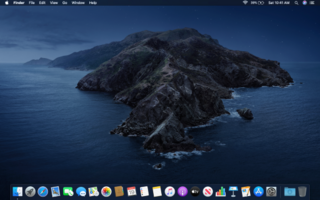
macOS is a proprietary graphical operating system developed and marketed by Apple Inc. since 2001. It is the primary operating system for Apple's Mac computers. Within the market of desktop and laptop computers it is the second most widely used desktop OS, after Windows NT and ahead of Chrome OS.

The Finder is the default file manager and graphical user interface shell used on all Macintosh operating systems. Described in its "About" window as "The Macintosh Desktop Experience", it is responsible for the launching of other applications, and for the overall user management of files, disks, and network volumes. It was introduced with the first Macintosh computer, and also exists as part of GS/OS on the Apple IIGS. It was rewritten completely with the release of Mac OS X in 2001.
The history of macOS, Apple's current Mac operating system formerly named Mac OS X until 2012 and then OS X until 2016, began with the company's project to replace its "classic" Mac OS. That system, up to and including its final release Mac OS 9, was a direct descendant of the operating system Apple had used in its Macintosh computers since their introduction in 1984. However, the current macOS is a Unix operating system built on technology that had been developed at NeXT from the 1980s until Apple purchased the company in early 1997.

Mac OS 9 is the ninth major release of Apple's classic Mac OS operating system which was succeeded by OS X. Introduced on October 23, 1999, it was promoted by Apple as "The Best Internet Operating System Ever", highlighting Sherlock 2's Internet search capabilities, integration with Apple's free online services known as iTools and improved Open Transport networking. While Mac OS 9 lacks protected memory and full pre-emptive multitasking, lasting improvements include the introduction of an automated Software Update engine and support for multiple users.

Watson was a software program released by Karelia Software for the Macintosh on November 27, 2001, which provided Internet content through a familiar Mac OS X-like interface through the use of plug-ins.

Sherlock, named after fictional detective Sherlock Holmes, was a file and web search tool created by Apple Inc. for the PowerPC-based "classic" Mac OS, introduced with Mac OS 8 as an extension of the Mac OS Finder's file searching capabilities. Like its predecessor, Sherlock searched for local files and file contents, using the same basic indexing code and search logic found in AppleSearch. Sherlock extended the system by enabling the user to search for items through the World Wide Web through a set of plugins which employed existing web search engines. These plugins were written as plain text files, so that it was a simple task for a user to write a Sherlock plugin.

Mission Control is a feature of the macOS operating system. Dashboard, Exposé, and Spaces were combined and renamed Mission Control in 2011 with the release of Mac OS X 10.7 Lion. Exposé was first previewed on June 23, 2003, at the Apple Worldwide Developers Conference as a feature of the then forthcoming Mac OS X 10.3 Panther.

Mac OS 8 is an operating system that was released by Apple Computer, Inc. on July 26, 1997. It includes the largest overhaul of the classic Mac OS experience since the release of System 7, approximately six years before. It places a greater emphasis on color than prior versions. Released over a series of updates, Mac OS 8 represents an incremental integration of many of the technologies which had been developed from 1988 to 1996 for Apple's overly ambitious OS named Copland. Mac OS 8 helped modernize the Mac OS while Apple developed its next-generation operating system, Mac OS X.

Sandvox is a WYSIWYG template-based website creation tool by Karelia Software, based on WebKit. Released May 16, 2006, it competes directly with Apple's iWeb and Realmac Software's RapidWeaver. Sandvox can be purchased with either a regular or pro license. The pro license includes additional features, such as the ability to include raw HTML pages and "pagelets" within the created website, along with Google Webmaster Tools integration. In 2007, Sandvox 1.2 won the runner-up Apple Design Award for Best Mac OS X User Experience.
Twitterrific is a macOS and iOS client for the social networking site Twitter created by The Iconfactory and was the first Twitter desktop client to come to macOS. It lets users view "tweets" or micro-blog posts on the Twitter website in real time as well as publish their own. Twitterrific is closed source software.

The family of Macintosh operating systems developed by Apple Inc. includes the graphical user interface-based operating systems it has designed for use with its Macintosh series of personal computers since 1984, as well as the related system software it once created for compatible third-party systems.

OS X Lion, also known as Mac OS X Lion, is the eighth major release of macOS, Apple's desktop and server operating system for Macintosh computers.
The App Store is a digital distribution platform for macOS apps, created and maintained by Apple Inc. The platform was announced on October 20, 2010, at Apple's "Back to the Mac" event. Apple began accepting app submissions from registered developers on November 3, 2010, in preparation for its launch.
The following outline of Apple Inc. is a topical guide to the consumer electronics, software, retail stores, corporate acquisitions, timeline, and personnel under the purview of the American multinational corporation Apple Inc. The company's best-known hardware products are the Macintosh, the iPod, the iPhone, and the iPad. Its best-known software includes the macOS and iOS operating systems, and the iTunes media browser. As of March 2014, Apple has 425 retail stores in 16 countries, and an online store.

OS X Yosemite is the eleventh major release of macOS, Apple Inc.'s desktop and server operating system for Macintosh computers.

The classic Mac OS is the series of operating systems developed for the Macintosh family of personal computers by Apple Inc. from 1984 to 2001, starting with System 1 and ending with Mac OS 9. The Macintosh operating system is credited with having popularized the graphical user interface concept. It was included with every Macintosh that was sold during the era in which it was developed, and many updates to the system software were done in conjunction with the introduction of new Macintosh systems.

macOS Mojave is the fifteenth major release of macOS, Apple Inc.'s desktop operating system for Macintosh computers. Mojave was announced at Apple's Worldwide Developers Conference on June 4, 2018, and was released to the public on September 24, 2018. The operating system's name refers to the Mojave Desert and is part of a series of California-themed names that began with OS X Mavericks. It succeeded macOS High Sierra and was followed by macOS Catalina.

macOS Catalina is the sixteenth major release of macOS, Apple Inc.'s desktop operating system for Macintosh computers. It is the successor to macOS Mojave and was announced at WWDC 2019 on June 3, 2019 and released to the public on October 7, 2019. Catalina is the first version of macOS to support only 64-bit applications and the first to include Activation Lock. It is also the last version of macOS to have the major version number of 10; its successor, Big Sur, released on November 12, 2020, is version 11.
Comparison of user features of operating systems refers to a comparison of the general user features of major operating systems in a narrative format. It does not encompass a full exhaustive comparison or description of all technical details of all operating systems. It is a comparison of basic roles and the most prominent features. It also includes the most important features of the operating system's origins, historical development, and role.















